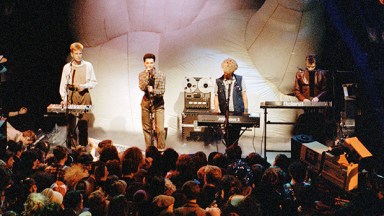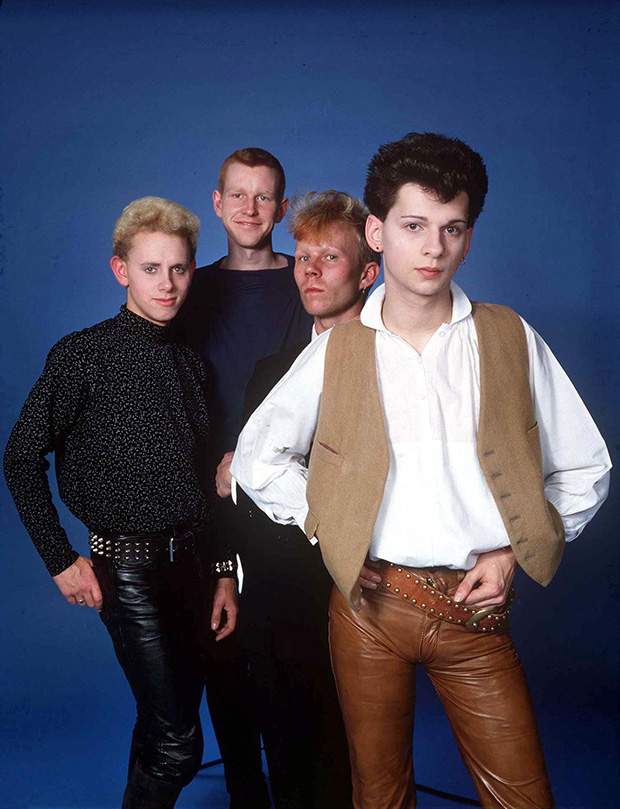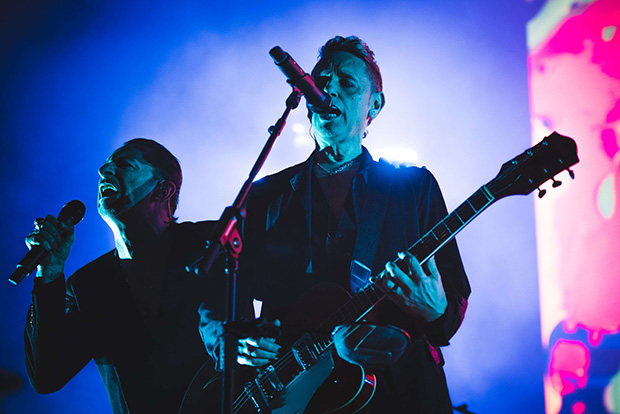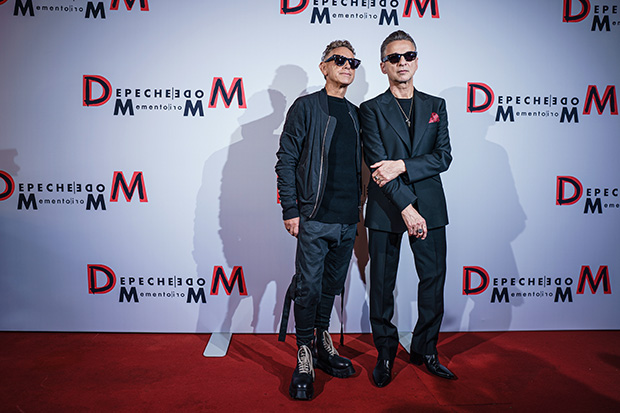
- Depeche Mode is an English electronic band formed in 1980.
- The band’s core lineup includes Dave Gahan, Martin Gore, and the late Andy Fletcher.
- Depeche Mode’s ‘Never Let Me Down’ was used in the first episode of 2023’s ‘The Last Of Us.’
In the vein of Kate Bush and Metallica on Stranger Things and The Cramps on Wednesday, Depeche Mode was given the spotlight in the debut episode of The Last Of Us. HBO’s adaptation of the hit video game delivered 2023 its first major needle drop by playing the band’s 1987 hit, “Never Let Me Down Again.” The moment furthered the harrowing journey of Joel (Pedro Pascal) and Ellie (Bella Ramsey) and introduced a new generation to Depeche Mode’s music.
“My wife has an encyclopedic knowledge of 1980s music,” The Last Of Us showrunner Craig Mazin told The Hollywood Reporter about using the song. “And I was like, ‘OK, Melissa, this is what I need.’ And I literally said all the things you just said. I need it to be a song that I kind of know but I haven’t heard in a long time. One that hasn’t been beaten to death. And I needed it to have context. I needed to be meaningful.”
“I needed to have be foreboding, and ideally, without being super on the nose, give me a comment,” added Mazin. “I needed to start a particular way so we can show that radio turning on. And then she was like: ‘Never Let Me Down Again.’ And I’m like, ‘Oh, my God.'”
That sentiment may be shared by many, as some predict Depeche Mode to receive the same streaming boost that “Running Up That Hill,” “Master Of Puppets,” and “Goo Goo Muck” that Kate Bush, Metallica, and The Cramps enjoyed after their music was used.
Update: On Tuesday, January 17th, there was a more than 520% increase in U.S. streams of “Never Let Me Down Again” on Spotify after the track played episode 1 (compared to one week prior). For those who want to keep track on future The Las of Us needledrops (as well as other happenings), they can tune into the official companion podcast on Spotify, where host Troy Baker (who voiced Joel in the video game) will break down episodes of the TV series, diving into key moments and reveal behind the scenes stories from the making of this action survival series.
For those who want to know more about the band, here’s a quick crash course on these icons.

Who Are Depeche Mode?
The band that would become Depeche Mode formed in Basildon, England, in 1977, according to American Songwriter. Classmates Andy Fletcher and Vince Clarke created a band with Fletcher on bass (later on keyboards) and Clarke on guitar and vocals. The duo first called themselves Composition of Sound with the addition of guitarist Martin Gore, who was in a band called French Look. In 1980, the trio enlisted the help of Dave Gahan. He suggested the band change its name to Depeche Mode.
In 1981, the band released its debut, Speak & Spell. Shortly after that, Clarke left the band to later form Yazoo and Erasure. Alan Wilder would replace him from 1982 to 1995. It was in that period that the band enjoyed its most significant commercial and critical success.
“Just Can’t Get Enough,” from Speak & Spell, is the band’s first Top 10 hit in the UK. With Clarke’s exit, Gore took over as the primary songwriter, and he’d take their sound in a more ambitious, bolder direction with albums A Broken Frame (1982), Construction Time Again (1983), and Some Great Reward (1984). The band’s sound would get darker with Black Celebration (1986), Music For The Masses (1987), and 1990’s Violator.
Violator is considered the band’s best album, as it features songs “Personal Jesus,” “Policy of Truth,” “World In My Eyes,” and “Enjoy The Silence.”
“Violator … wasn’t just Depeche Mode’s biggest album, cementing their status as the world’s first electronic stadium stars and prompting a riot at an LA record signing,” wrote The Guardian’s Dorian Lynskey in 2006. “It was also their best, encasing Martin Gore’s favorite tropes – guilt, salvation, obsession, and the virtues of keeping your mouth shut – in production as black and shiny as a beetle’s shell.”
“Violator, that was our time,” Andy Fletcher told Under The Radar in 2009. “Every big band has their time. Coldplay is having theirs right now. To be honest, we actually play to more people now than we played to when Violator was out. I still think Violator is our best album, but I also think the other albums aren’t too far behind. We’re very realistic for a band in our position. We do okay, and for a band that’s been around for a long time, I feel we’re still quite relevant.”
The darkening of Depeche Mode’s sound appealed to new wavers, punks, and the growing goth subculture. The crossover appeal reached the mainstream with Violator, and the band enjoyed a renewed appreciation during the industrial’s rise in the 1990s. Depeche Mode’s “Barrel of a Gun” was heard alongside Nine Inch Nail’s “Closer” and Rammstein’s “Du Hast.”
The creative songcraft, fronted by Dave Gahan’s undeniable sex appeal and charisma, made Depeche Mode one of the most enduring groups of the 1980s. The group was inducted into the Rock & Roll Hall of Fame in 2002.
Depeche Mode continued to record and tour in the subsequent decades since Violator, releasing Songs of Faith and Devotion (1993), Ultra (1997), Exciter (2001), Playing the Angel (2005), Sounds of the Universe (2009), Delta Machine (2013), and Spirit (2017). Sadly, Andy Fletcher died in May 2022 at age 60 after suffering an aortic dissection.
What Does The Phrase’ Depeche Mode’ Mean?

“Depeche Mode,” taken from the French magazine of the same name, means “fashion news” or “fashion dispatch,” per American Songwriter. The misconception is that the band’s name translates to “hurried fashion” since the French verb dépêcher means “to hurry.”
The magazine, published from 1970 to 2001, sued the band. There were lawsuits flying around because we’d copied the name,” Dave Gahan reportedly said of the name issue. “Once we became more successful, they let it go because we probably helped them to sell more copies.”
How Was Depeche Mode Used In ‘The Last Of Us’
Minor spoilers for Episode 1…
In the first episode of The Last Of Us, Ellie stumbles upon a book called The Billboard Book of Number One Hits, an actual book that can be purchased. Inside the book is a piece of paper with a code corresponding to Joel’s radio. “60 means they don’t have anything new, and 70’s, they’ve got new stuff,” the smuggler says, per Digital Spy. He doesn’t explain what the red X by “80” means, but when Wham’s “Wake Me Up Before You Go-Go” plays, Joel is upset. Apparently, any song from the 1980s means trouble.
Before the episode ends, the radio in Joel’s room begins to play a song, but no one is there to hear that it’s “Never Let Me Down Again.” Dave Gahan’s foreboding voice sings, “I’m taking a ride with my best friend/I hope he never lets me down again” as the credits roll, leading viewers to suspect something ominous is about to happen.
What Happened To Dave Gahan, The Lead Singer Of Depeche Mode?
Dave Gahan died in 1996 – briefly. On May 28 of that year, he was technically dead from an overdose of heroin and cocaine. When Dave was revived by the paramedics, he asked if he’d overdosed again. “No, David, you died,” the paramedic responded, Gahan recounted to Chicago Tribune (h/t Ultimate Classic Rock). “You flatlined for a couple of minutes. You were actually dead.”
Dave would later discover that he had to be revived three times. “I was clean for a few weeks when I came back [to Los Angeles] from New York, where I was working with the band,” Gahan told the Los Angeles Times. “I went out and shot a speedball one time. The dealer left, and I went green. Luckily, there was someone to call 911.” The overdose came one year after he attempted suicide, and the fallout of his near-death – he was arrested, jailed, and forced into a court-ordered counseling program and drug testing – resulted in him getting sober. He’s been clean ever since.
The event also meant that the band didn’t tour following the release of Ultra in 1997, with Dave fearing that the temptations of the road would lead him back into addiction. r told MTV at the time that the Songs of Faith and Devotion Tour “I think the fans know what we’ve been through,” Fletcher told MTV at the time. “I think they understand that we’re not physically as able as perhaps before to tour at this time.”
What Is Depeche Mode’s Biggest Hit?
“Never Let Me Down Again” could become Depeche Mode’s biggest hit in 2023 if it enjoys the same renewed success that Kate Bush’s “Running Up That Hill” did after Stranger Things used the song in 2022.
However, heading into 2023, the band’s biggest hit is “Enjoy The Silence” from Violator. It reached No. 6 on the British singles chart and No. 8 in the U.S. – the band’s highest-charting song in America. It is also certified Gold by the RIAA and Platinum in their home country.
Others might argue that “Personal Jesus” is the band’s biggest hit. Johnny Cash famously covered the song for American IV: The Man Comes Around, the same Rick Rubin-produced album that saw the country music icon cover Nine Inch Nails’ “Hurt.”
What Are Depeche Mode Fans Called?
Fan armies and fan collective names existed long before K-Pop. In 1993, Depeche Mode fans christened themselves “Devotees” following that year’s “Devotional Tour,” promoting their album, Songs of Faith and Devotion.
“During the tour, the stage crew and roadies wore T-shirts with the words “Devotee” printed on them in purple, and that is when the term Devotee first caught on,” writes Scott Hodge for the Diary of a Devotee blog.
Is Depeche Mode Touring In 2023?

Depeche Mode announced in October 2022 that the band – Dave Gahan and Martin Gore – would embark on a world tour in March 2023 in support of their 15th studio album, Memento Mori. It marks the first tour since Andy Fletcher’s death.
“We started work on this project early in the pandemic,” Martin Gore said in a statement about the tour, the band’s first set of live shows in five years, “and its themes were directly inspired by that time. After Fletch’s passing, we decided to continue as we’re sure this is what he would have wanted, and that has really given the project an extra level of meaning.” Dave Gahan added
“Fletch would have loved this album,” added Gahan. “We’re really looking forward to sharing it with you soon, and we can’t wait to present it to you live.”
For further information on the tour routing and ticket on-sale dates, please go to depechemode.com. The full listing of dates, cities, and venues is also below.
Memento Mori World Tour 2023
March 23 – Sacramento, CA – Golden 1 Center
March 25 – San Jose, CA – SAP Center
March 28 – Los Angeles, CA – Kia Forum
March 30 – Las Vegas, NV – T-Mobile Arena
April 2 – San Antonio, TX – AT&T Center
April 5 – Chicago, IL – United Center
April 7 – Toronto, ON – Scotiabank Arena
April 9 – Quebec City, QC – Videotron Centre
April 12 – Montreal, QC – Centre Bell
April 14 – New York, NY – Madison Square Garden
May 16 – Amsterdam, NL – Ziggo Dome
May 20 – Antwerp, BE – Sportpaleis Antwerpen
May 23 – Stockholm, SE – Friends Arena
May 26 – Leipzig, DE – Leipziger Festwiese
May 28 – Bratislava, SK – Národný Futbalový Štadión
May 31 – Bordeaux, FR – Matmut Atlantique
June 2 – Barcelona, ES – Primavera Sound Festival
June 4 – Dusseldorf, DE – Merkur Spiel-Arena
June 6 – Dusseldorf, DE – Merkur Spiel-Arena
June 9 – Madrid, ES – Primavera Sound Festival
June 11 – Bern, CH – Stadion Wankdorf
June 14 – Dublin, IE – Malahide Castle
June 17 – London, UK – Twickenham Stadium
June 20 – Munich, DE – Olympiastadion
June 22 – Lille, FR – Stade Pierre Mauroy
June 24 – Paris, FR – Stade de France
June 27 – Copenhagen, DK – Parken
June 29 – Frankfurt, DE – Deutsche Bank Park
July 4 – Lyon, FR – Groupama Stadium
July 7 – Berlin, DE – Olympiastadion
July 12 – Rome, IT – Stadio Olympico
July 14 – Milan, IT – San Siro
July 16 – Bologna, IT – Stadio Renato Dall’Ara
July 21 – Klagenfurt, AT – Wörthersee Stadion
July 23 – Zagreb, HR – Arena Zagreb
July 26 – Bucharest, RO – Arena Națională
July 28 – Budapest, HU – Puskás Aréna
July 30 – Prague, CZ – Letňany Airport
August 2 – Warsaw, PL – PGE Narodowy
August 6 – Tallinn, EE – Tallinna Lauluväljak
August 8 – Helsinki, FI – Kaisaniemen Puisto
August 11 – Oslo, NO – Telenor Arena


